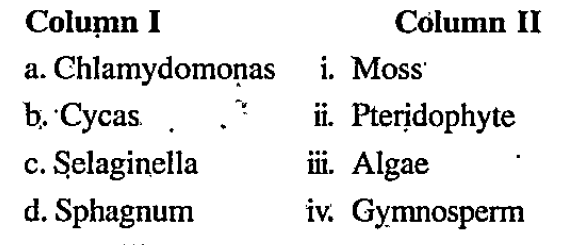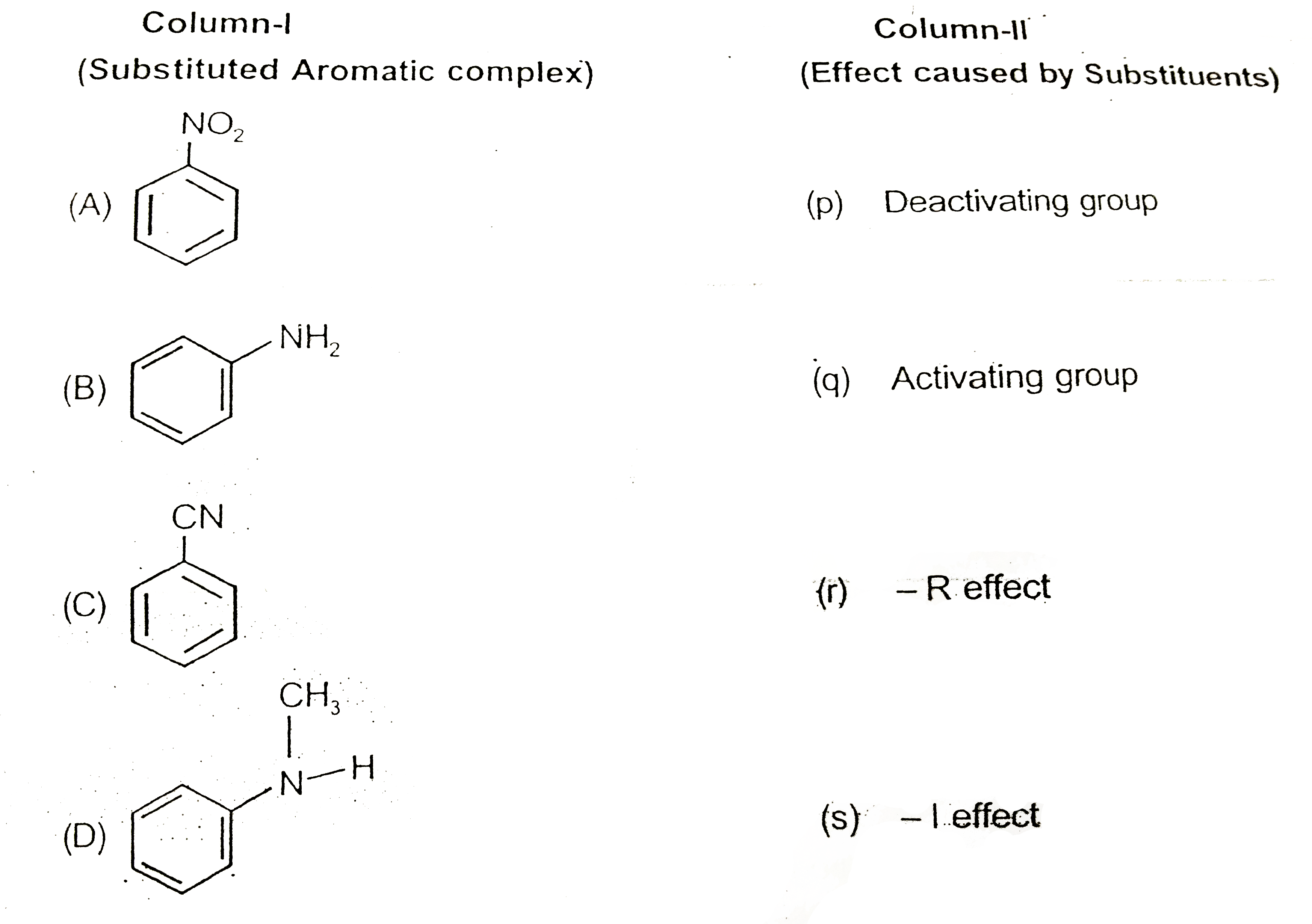Match the following (Coloumn I with coloumn II)
 Solution in Malayalam
Solution in Malayalam
Step by step video & image solution for Match the following (Coloumn I with coloumn II) by Biology experts to help you in doubts & scoring excellent marks in Class 11 exams.
Updated on:21/07/2023Topper's Solved these Questions
Similar Questions
Ethylene is used for
View Solutionchoose the correct answer
Structures seen in bacterial cell is
View SolutionMatch The coloumn I and II. (Matrix)
View SolutionMatch The coloumn I and II. (Matrix)
View SolutionMatch the coloumn-I with column-II

View SolutionMatch the following. a. Mixotrophic protist (Coloumn I) - (i) Paranema(Coloumn II) b. Plasmodial slime mould (Coloumn I) - (ii) Polysphondylium(Coloumn II) c. Holozoic protist (Coloumn I) - (iii) Euglena(Coloumn II) d. Saprobic protist (Coloumn I) - (iv) Physerum(Column II) e. Communal slime mould (Coloumn I) - (v) Rhabdomonas (Coloumn II)
View SolutionMatch the following coloumn. a. Corticolous (Coloumn I) - (i) Fungi growing on cow dung (Coloumn II) b. Xylophilous (Coloumn I) - (ii) Fungi growing on wood (Coloumn II) c. Epicylic (Coloumn I) - (iii) Fungi growing on hair (Coloumn II) d. Keratinophilous (Coloumn I) - (iv) Fungi growing on burnt wood (Coloumn II) e. Coprophilous (Coloumn I) - (v) Fungi growing on bark (Coloumn II)
View SolutionMatch the following. a. Gametangial contact (Coloumn I) - (i) Agaricus(Coloumn II) b. Planogametic copulation(Coloumn I) - (ii) Mucor(Coloumn II) c. Somatogamy(Coloumn I) - (iii) Puccinia(Coloumn II) d. Gametangial copulation (Coloumn I) - (iv) Allomyces (Coloumn II) e. Spermatization(Coloumn I) - (v) Pythium (Coloumn II)
View SolutionMatch the following. a.Floating roots(Coloumn I) - (i)Podostemon(Coloumn II) b. Assimilatory roots(Coloumn I) - (ii)Cuscuta (Coloumn II) c. Hygroscopic roots(Coloumn I) - (iii)Bryophylum (Coloumn II) d. Haustorial roots(Coloumn I) - (iv)Jussiaea (Coloumn II) e. Epiphylous roots(Coloumn I) - (v)Orchids(Coloumn II)
View SolutionMatch the coloumn I with coloumn II and select the correct option. a. Rhizome(Coloumn I) - (i) Lily(Coloumn II) b. Bulb(Coloumn I) - (ii) Gladiolus(Coloumn II) c. Sucker(Coloumn I) - (iii) Grass(Coloumn II) d. Corm(Coloumn I) - (iv) Curcuma(Coloumn II) e. Runner(Coloumn I) - (v) Banana(Coloumn II)
View SolutionMatch the following coloumns and select the correct option. a. Hibernation(Coloumn-I) - (i) Snails(Couloumn-II) b. Aestivation(Coloumn-I) - (ii) Many zooplanktons(Coloumn-II) c. Migration(Coloumn-I) - (iii) Polar bears(Coloumn-II) d. Diapause(Coloumn-I) - (iv) Siberian cranes(Coloumn-II)
View SolutionMatch coloumn-I with coloumn-II and select the correct option using the codes given below (a) E. Coli(Coloumn-I) - (i) cDNA is early embryonic cell(Coloumn-II) (b) ADA deficiency(Coloumn-I) - (ii) Human insuline(Coloumn-II) (c) Rosie(Coloumn-I) - (iii) Alpha-1-antitrypsin(Coloumn-II) (d) Emphysema(Coloumn-I) - (iv) Alpha-lactalbumin(Coloumn-II)
View SolutionMatch the coloumn-I with column-II

View SolutionMatch the following coloumn. a. Corticolous (Coloumn I) - (i) Fungi growing on cow dung (Coloumn II) b. Xylophilous (Coloumn I) - (ii) Fungi growing on wood (Coloumn II) c. Epixylic (Coloumn I) - (iii) Fungi growing on hair (Coloumn II) d. Keratinophilous (Coloumn I) - (iv) Fungi growing on burnt wood (Coloumn II) e. Coprophilous (Coloumn I) - (v) Fungi growing on bark (Coloumn II)
View SolutionMatch the following. a. Gametangial contact (Coloumn I) - (i) Agaricus(Coloumn II) b. Planogametic copulation(Coloumn I) - (ii) Mucor(Coloumn II) c. Somatogamy(Coloumn I) - (iii) Puccinia(Coloumn II) d. Gametangial copulation (Coloumn I) - (iv) Allomyces (Coloumn II) e. Spermatization (Coloumn I) - (v) Pythium (Coloumn II)
View SolutionMatch the following. a.Floating roots(Coloumn I) - (i)Podostemon(Coloumn II) b. Assimilatory roots(Coloumn I) - (ii)Cuscuta (Coloumn II) c. Hygroscopic roots(Coloumn I) - (iii)Bryophylum (Coloumn II) d. Haustorial roots(Coloumn I) - (iv)Jussiaea (Coloumn II) e. Epiphylous roots(Coloumn I) - (v)Orchids(Coloumn II)
View Solution
